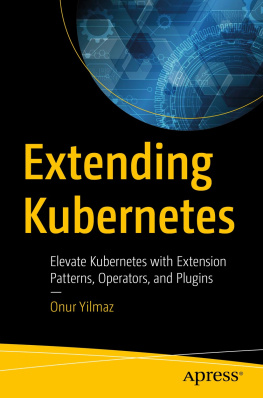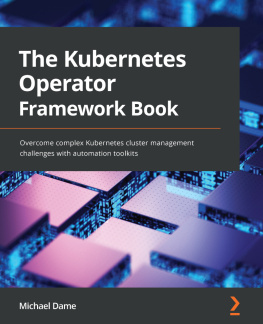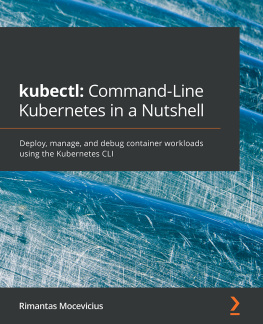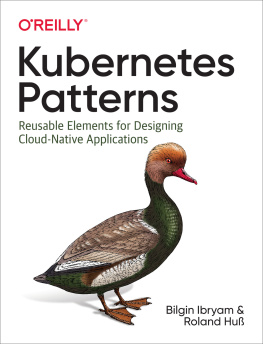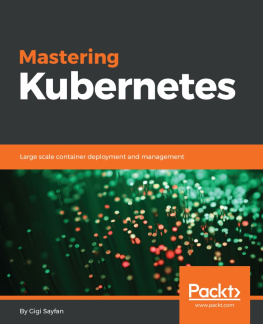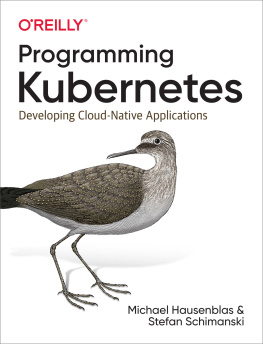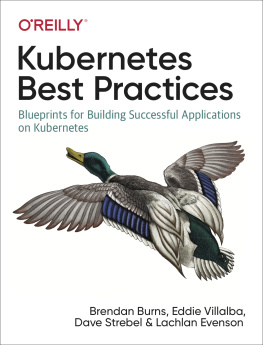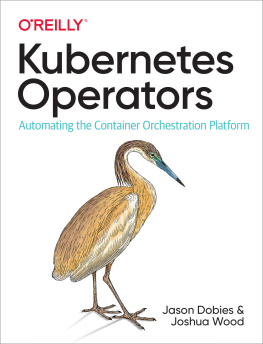Onur Yilmaz - Extending Kubernetes: Elevate Kubernetes with Extension Patterns, Operators, and Plugins
Here you can read online Onur Yilmaz - Extending Kubernetes: Elevate Kubernetes with Extension Patterns, Operators, and Plugins full text of the book (entire story) in english for free. Download pdf and epub, get meaning, cover and reviews about this ebook. year: 2021, publisher: Apress, genre: Computer. Description of the work, (preface) as well as reviews are available. Best literature library LitArk.com created for fans of good reading and offers a wide selection of genres:
Romance novel
Science fiction
Adventure
Detective
Science
History
Home and family
Prose
Art
Politics
Computer
Non-fiction
Religion
Business
Children
Humor
Choose a favorite category and find really read worthwhile books. Enjoy immersion in the world of imagination, feel the emotions of the characters or learn something new for yourself, make an fascinating discovery.
- Book:Extending Kubernetes: Elevate Kubernetes with Extension Patterns, Operators, and Plugins
- Author:
- Publisher:Apress
- Genre:
- Year:2021
- Rating:5 / 5
- Favourites:Add to favourites
- Your mark:
- 100
- 1
- 2
- 3
- 4
- 5
Extending Kubernetes: Elevate Kubernetes with Extension Patterns, Operators, and Plugins: summary, description and annotation
We offer to read an annotation, description, summary or preface (depends on what the author of the book "Extending Kubernetes: Elevate Kubernetes with Extension Patterns, Operators, and Plugins" wrote himself). If you haven't found the necessary information about the book — write in the comments, we will try to find it.
Onur Yilmaz: author's other books
Who wrote Extending Kubernetes: Elevate Kubernetes with Extension Patterns, Operators, and Plugins? Find out the surname, the name of the author of the book and a list of all author's works by series.
Extending Kubernetes: Elevate Kubernetes with Extension Patterns, Operators, and Plugins — read online for free the complete book (whole text) full work
Below is the text of the book, divided by pages. System saving the place of the last page read, allows you to conveniently read the book "Extending Kubernetes: Elevate Kubernetes with Extension Patterns, Operators, and Plugins" online for free, without having to search again every time where you left off. Put a bookmark, and you can go to the page where you finished reading at any time.
Font size:
Interval:
Bookmark:
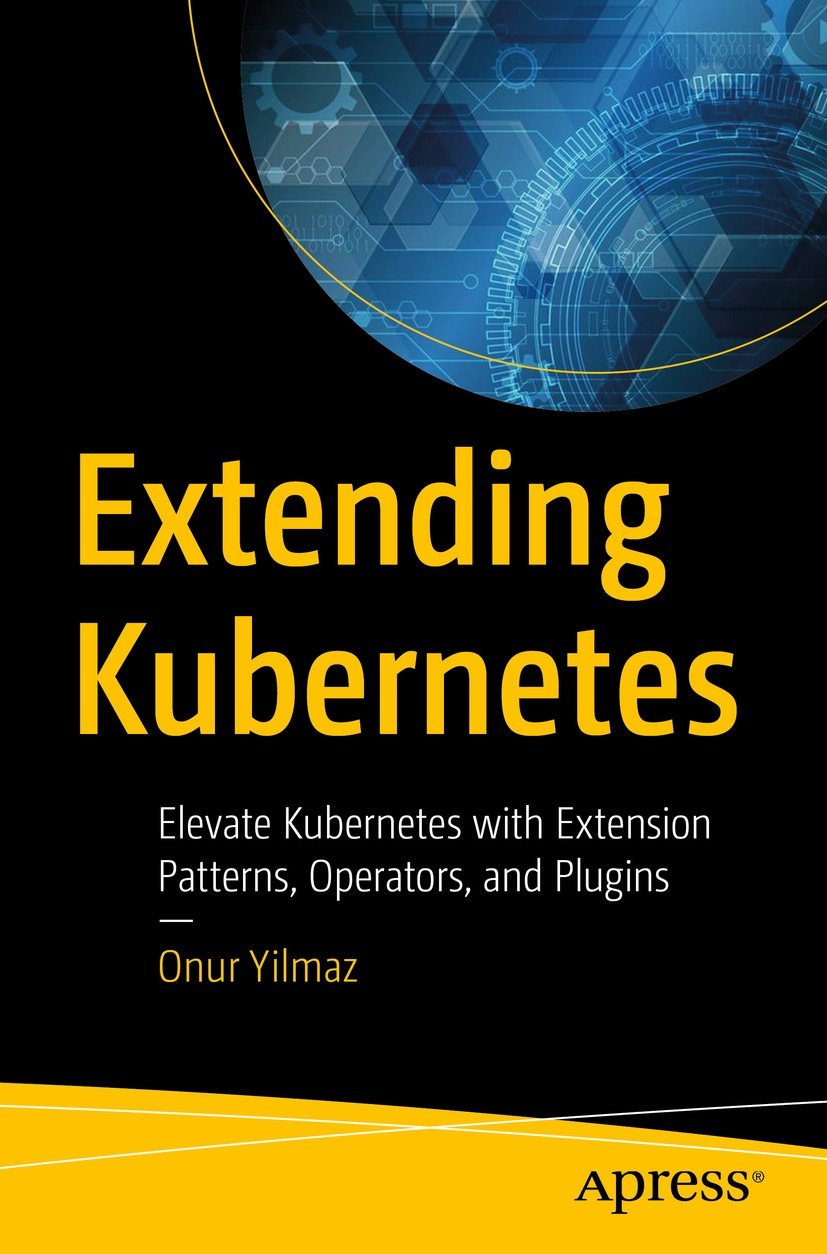

Any source code or other supplementary material referenced by the author in this book is available to readers on GitHub via the books product page, located at www.apress.com/978-1-4842-7094-3. For more detailed information, please visit http://www.apress.com/source-code.
This Apress imprint is published by the registered company APress Media, LLC part of Springer Nature.
The registered company address is: 1 New York Plaza, New York, NY 10004, U.S.A.
For my wife Nursin and my daughter Ece for their incredible support
The future is in the skies.
Mustafa Kemal Ataturk, Founder of Turkish Republic
In recent years, applications have become smaller and more self-governing with the microservices paradigm shift. Furthermore, they are built, tested, and deployed as containers with less overhead and flexibility. Thus, if you aim to develop the applications of the future, you need to aim for the clouds and containers. However, the management of distributed applications in a scalable, reliable, and flexible way is not straightforward. You need a well-architectured abstraction layer between applications and the clouds. Kubernetes has become the de facto orchestrator for cloud-native applications running in the containers with its open architecture and industry adoption.
Kubernetes is a complex but open system with well-designed extension points and plugins. It is possible to extend Kubernetes by implementing the APIs in a cloud-native way and make it work for your custom requirements and infrastructure. This book is a comprehensive guide for understanding the extension patterns and discovering the extension plugins for Kubernetes. In this book, you will learn the state-of-the-art extension patterns and extension points of Kubernetes in depth with real-life use cases and examples. You will have a comprehensive overview of all possible aspects of Kubernetes, starting from end user to the fully automated controller development. Also, the book focuses on creating applications that not only work on Kubernetes but also interact and operate Kubernetes itself.
This book is for a wide range of audience, including, but not limited to, software engineers, developers, DevOps engineers, cloud security analysts, architects, and managers who have Kubernetes in their short- and long-term plans. However, this is not a starters guide to containers, cloud providers, or Kubernetes. It is expected to have an introductory knowledge and hands-on experience on Kubernetes to grasp the content fully and follow up the activities.
In the following chapters, Kubernetes API and extension points with respective design patterns will be covered with their theoretical background, hands-on activities, and exercises. At the end of the book, you will be more enthusiastic about the future of Kubernetes and how you will extend the Kubernetes to enrich its ecosystem.
is a senior software engineer at a multinational enterprise software company. He is a Certified Kubernetes Administrator (CKA) and works on Kubernetes and cloud management systems as a keen supporter of cutting-edge technologies. Furthermore, he is the author of multiple books on Kubernetes, Docker, serverless architectures, and cloud-native continuous integration and delivery. In addition, he has one masters and two bachelors degrees in the engineering field.

is a software engineer and Certified Kubernetes Application Developer (CKAD). He has been working on the lifecycle management of applications on Kubernetes and developing operators for 3.5 years.
Life is like an onion; you peel it off one layer at a time, and sometimes you weep.
Carl Sandburg
American poet, biographer, journalist, and editor with three Pulitzer Prizes
Kubernetes is like an onion. You peel it off one layer at a time, and sometimes you weep, check your YAML file, and read more documentation.
Kubernetes is a complex system. This first chapter will start with a short history of Kubernetes and how it has grown to a complex system. Although it already has many layers, it is also extensible with additional layers. This chapter will also discuss how to configure a Kubernetes system, its extension patterns, and points. At the end of this chapter, you will grasp the complexity of Kubernetes and its capabilities.
Lets start with a short recap of Kubernetes history and its features.
Kubernetes is an open source system for managing containerized applications. The name originates from Greek with the meaning of helmsman . So, it is not wrong to say that Kubernetes is the tool to help you find Moby Dick in the stormy oceans of containers and microservices.
Google open-sourced Kubernetes in 2014, and it was the accumulated experience of running production workloads in containers over decades. In 2015, Google announced the Kubernetes projects handover to the Cloud Native Computing Foundation (CNCF) . including the worlds most giant public cloud and enterprise software companies and over a hundred innovative startups. The foundation is a vendor-neutral home for many of the fastest-growing projects including
Font size:
Interval:
Bookmark:
Similar books «Extending Kubernetes: Elevate Kubernetes with Extension Patterns, Operators, and Plugins»
Look at similar books to Extending Kubernetes: Elevate Kubernetes with Extension Patterns, Operators, and Plugins. We have selected literature similar in name and meaning in the hope of providing readers with more options to find new, interesting, not yet read works.
Discussion, reviews of the book Extending Kubernetes: Elevate Kubernetes with Extension Patterns, Operators, and Plugins and just readers' own opinions. Leave your comments, write what you think about the work, its meaning or the main characters. Specify what exactly you liked and what you didn't like, and why you think so.

